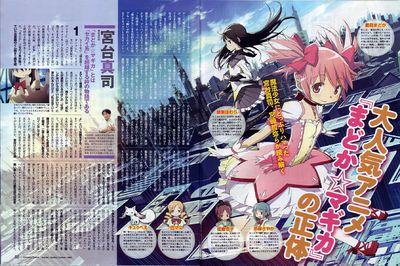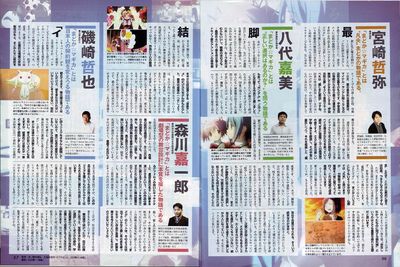Spa Weekly! 2011-07-19
Why Grown-up Men Also Cried After They Watched Puella Magi Madoka Magica

Translation courtesy of symbv from evageeks forum
Translator's comment: There was a long discussion between five "noted commentators" on the anime, why it was so popular even outside the usual anime fandom, and what it means to contemporary Japanese and the society. Its online site has one short report, named "Why grown-up men also cried after they watched PMMM" Source: [1]
「最後にね、友情がね、奇跡を起こすんですよ……」と切なげに語るのは、精密機械メーカーで営業職の中山亨さん(仮名・38歳)だ。 "It was the ending.. There was friendship, and it made a miracle...". Nakayama-san (age 38), working in a precise instrument maker company, said with some sadness.
「まどかとさやか、まどかとマミさん、さやかと杏子、いろんな組み合わせの友情が描かれますが、すべて過酷な運命に翻弄され報われない結果を迎えます。でも、まどかとほむらだけが最後の最後に奇跡を起こす。しかも、まどかは因果を受け入れ、せっかく成就した友情という絆をも軽々と乗り越えてしまう。なんか、その奇跡に立ち会えたことに感謝したくなるんですよ」
"There were various friendship pair-ups like Madoka and Sayaka, Madoka and Mami, Sayaka and Kyoko, in the show, and all of them were tossed around by cruel fate and met an unfulfilled end. But there was also Madoka and Homura - only they managed to cause a miracle at the end of the end. Not only that, Madoka accepted all the causes and effects and calmly got over the hold-up resulting from a friendship that finally bore fruit. Well, it made me want to say thanks for being able to encounter such a miracle."
保険会社に勤める斉田哲治さん(仮名・42歳)は「僕も、まどかのように取り柄がないんですよ。『僕には何ができるんだ?』って、ずっとそういうふうに悩んでいました」と告白する。
Saida-san (age 42), who worked in an insurance company, said "I don't think I have the merit as shown by Madoka. I have always been troubled by the thought 'What am I able to do?'"
「いわば凡人であるまどかが、選択を繰り返し何かを得たり失ったり。だからこそ最後の選択に心が震えるわけです。お母さんが背中を押してくれるシーン、歴代の魔法少女たちを慰撫するシーン、あぁ、もう目から汗が……。あ、でも、杏子も好きですよ」
"Madoka is a so-called "ordinary person" and she came across repeated occasions of choices and through the choices won something and lost something. And because of all these I could feel my shuddering at my heart when I saw her final choice. The scene when her mother came to back her up; the scene when she comforted all those mahou shoujo in history...Ah! My eyes are already watering.... Ah, and also I really love Kyoko!"
「まどかの行為は滅私のようで、その実、愛する人たちとの関係性を内包し続けるという自己愛で、本人もそれに自覚的」と気難しい顔で語るのは高城亮さん(仮名・34歳)。
Takagi-san (age 34) said with a moody face, "It looked as if Madoka's behavior was all altruistic, but in its core, there was also the self-love which also continued to be inclusive of the links towards all those she loved. I am also very much aware of such within myself."
「周囲や視聴者が感じがちな悲しみは、『忘却されること』が『死』と近似的だからだろうけど、彼女は死んでいないので、本人は案外平気だと思う。宗教、倫理規範のない日本におけるボランタリズムのあるべき姿にも通じ、『ボランティアが好き』と言うたびに周囲に怪訝な顔をされてきた自分を肯定してくれた気がするんです」
"The sadness often expressed by the viewers and those around me is due to the thought that "being forgotten" is so close to "death," but since she has not died, I myself am surprisingly, fine with it. It can be reflected back into how volunteerism should be like in Japan where there is no religion and no external moral standard. When I told everyone that "I love to volunteer" and they showed me dubious faces. I feel that this anime confirms that I am in the right."
聞けば、社会学者の宮台真司氏、評論家の宮崎哲弥氏、幹細胞生物学者の八代嘉美氏といった“知の巨人”たちも同様に『まどマギ』にハマっているというではないか。そこで、彼らにも現在発売中の週刊SPA!7月19日号で縦横無尽に語ってもらった。
Editors of Spa: When we asked around, we found that "big names of intelligentsia" like sociologist Shinji Miyadai, commentator Tetsuya Miyazaki, stem cell biologist Yoshimi Yashiro are also big fans of Madoka Magika. And we have invited them to talk freely about this anime in the latest July 19th issue of Weekly Spa.
The five commenting on Madoka in the Spa Weekly are (all links are in Japanese) [2]:
- Shinji Miyadai - sociologist
- Tetsuya Miyazaki - noted commentator
- Yoshimi Yashiro - stem-cell biologist
- Kaichiro Morikawa - associate professor, Meiji University
- Tetsuya Isozaki - CPA, net business and finance blogger [3]
Shinji Miyadai (sociologist)

Translation courtesy of symbv from evageeks forum
Translator comment: You can see how "high criticism" of anime in Japan is like. In fact 2ch [Madoka fans] do not think much of the point of view, particularly when he said that Japan now is not good for a cheerful show like K-On.
Shinji Miyadai is a Professor of Urban Liberal Studies in Tokyo Metropolitan University. Specialized in Social System Theory. Recent books written include “Earthquake and Nuclear Energy – The Crisis from Now On” co-authored with video journalist Tetsuo Jinbo.
“Madoka Magica” is a story about bonds that surpassed “Sekai-kei”
In 1979 there was “Mobile Suit Gundam”; in 1995 there was “Neo-Genesis Evangelion” (Eva). In a 15-year cycle there is an epoch-making anime and “Madoka” clearly came out from this trend. When “Eva” was out it was precisely 1995 when the mood of fin de siècle was very much in the air as the great earthquake of Hanshin-Awaji and the incident of Aum Shinrikyo sect happened. After that, there were many works of “sekai-kei” in which the mystery of the “world” is directly connected to the character's own issues. I believe “Madoka” is a story that overcame the trap of “sekai-kei” where the feeling of the self-consciousness reached a dead-end.
In Sekai-kei, as long as the protagonist is recognized by the surrounding then anything is OK, but it is the opposite in Madoka: Even though the surrounding is telling you that “Because only this 'society' will give you the recognition, do not leave,” you make the decision that “I will still leave.” What made this development a reality is the bond between Madoka and those surrounding her. Although Madoka did not notice the bond that gradually grew out of bits and pieces everyday, she eventually noticed its cause and effect and came to accept her role. And so even we are talking about Mahou Shoujo, it is not really about transformation but a body flip-over. She is a heroine who flips over herself and cannot un-flip back to what she was.
This is in synch with the earthquake I mentioned earlier. In a crisis situation, the bonding will be tested in all ways imaginable. What would be the means you can still rely till the end? Even though we may hold certain worry that such bond may be just as a playful thing, we cannot live without bonds [to each other]. I feel that it managed to reproduce the mood of year 2011.
It would be difficult to produce a cheerful slice-of-life drama like “K-On!!” in a Japan after the earthquake, and “Madoka” may be the antithesis to “shitty” midnight anime in 00s that had become something that only some of the males could enjoy.
Another thing that is important is the element of “wish”. Even though I meant well but then I got bound to something undesirable – it was just like what we experienced through the earthquake. It is also the cause of miscommunication. In Episode 3, Madoka's dialogue, “I did not ask for the cellphone number” can also be interpreted as a metaphor for that. The flip side of making a wish also means grudge and resentment remain. And originally this was the general principle behind Greek tragedies. All the events in “Madoka” also established the cause and effect along the extension line of the conducts of the characters. There is a “world” inside the “society”. In contrast, in “Eva” the absurdities that were the “Angels” came from a “world” that was outside the “society”. It may be a thinking from the school of romanticism, the drama [in sekai-kei] always tend to depend on an outside source. This common issue faced by sekai-kei was overcome by the bonding in “Madoka”.
An ordinary young girl noticed the connections that had been supporting her, made a flip-over, and fulfilled her duty. As a structure for a story, it is truly moving. I could not hold back my tears at the end. I can watch it many many times. It is clearly a meaningful work no matter if an ordinary girl watches it or a grown-up man like me watches it.
| Original Japanese Text (click show to see) |
|---|
| 「まどか☆マギカ」は絆の物語 |
| ■社会学者・宮台真司 |
| ■宮台真司 社会学者・首都大学東京都市教養学部教授。東京都立大学助教授、首都大学東京准教授を経て現職。専門は社会システム論。近著にビデオジャーナリスト・神保哲生氏らとの共著『地震と原発 今からの危機』(扶桑社)など |
| 1979年に『機動戦士ガンダム』、1995年に『新世紀エヴァンゲリオン』 (以下『エヴァ』)とエポックメイキングな作品は15年周期で生まれていて『まどか』もやはり、その流れで出てきたと思います。ちょうど『エヴァ』 は’95年の阪神淡路大震災とオウム事件という世紀末感を掬い上げていました。それ以降、「世界」の謎が自分の問題と直結する「セカイ系」と呼ばれる作品 が多く生まれました。『まどか』はセカイ系が陥っていた自意識のどん詰まり感を超えていく物語だと考えています。 |
| セカイ系では主人公が 周囲から承認されればすべてOKですが、まどかは逆で、周りからは「あなたが承認されるのはこの『社会』しかないから出ていかないで」と言われるんだけど 「私は出ていくよ」という決断をする。その展開をリアルにしているのは、まどかと周囲の絆なんですね。毎日の積み重ねで生まれてゆく絆、まどかはそれに気 づいてなかったんだけど、最終的にその因果に気づいて自分の役割を引き受ける。だから魔法少女と言っても変身じゃなくて翻身。二度と戻れない翻身のヒロイ ンなんです。 |
| これは先の震災ともシンクロするんですが、危機的な状況下では、ありとあらゆる局面で絆が試されますよね。何が最後まで頼 れるよすがになるのか。普段はただの戯れじゃないのかという疑念を抱えながらも、我々は絆なしには生きられない。そんな2011年の気分が写し取られてい る気がします。 |
| 震災後の日本で『けいおん!!』のようなお気楽な日常ドラマは難しいし、すでに一部の男性しか享受できなくなりつつあった“クソみたい”なゼロ年代的深夜アニメに対するアンチテーゼとしての『まどか』だったのかもしれない。 |
| もうひとつ重要なのは、「願い」という要素です。よかれと思ってしたことが大変なことに繋がってしまうというのは、我々がまさに震災で経験したことです。 これはディスコミュニケーションにも起因します。第3話に出てくる「携帯の番号、聞いてなかった」というまどかのセリフもそういうことへのメタファーとも 読み取れる。願い事というのは裏を返せば怨念や恨みを残すことにもなる。もともとこれはギリシャ悲劇の基本原則に沿ったものなんですが『まどか』の劇中の 出来事もすべて人の振る舞いの延長線上に因果が成り立っていて、「社会」のなかに「世界」がある。対照的に『エヴァ』だと使徒という不条理が「社会」の外 である「世界」からやってくる。これはロマン派的な考え方なんですが、どうしてもドラマが他力本願になりがちなんですね。そんなセカイ系が持つ課題を『ま どか』は絆により乗り越えた。 |
| 平凡な少女が自分を支えていた関係性に気づき、翻身をして、義務を果たす。物語の構造として感動的ですよね。最後のほうは涙なしではいられなかったです。何度見てもいい。普通の女のコが見ても、僕みたいなおじさんが見ても、明らかに意味のある作品ですから。 |
Tetsuya Miyazaki (commentator)

Translation courtesy of symbv from evageeks forum
Commentator working in various media focusing mainly on current affairs, political philosophy, and Buddhism. He also carries in-depth studies regarding sub-culture. Recent books include “Loneliness Sayonara Meeting,” co-authored with monk Ryunosuke Koike.
When I first saw the bewitched space I was surprised. It was so successful at giving that premonition feeling that “something must be hiding inside.” Although there are quite a lot of titles in midnight anime which ended without fully developing the main theme, “MadoMagi” completed it magnificently. What made such a feat possible was the existence of the role of Kyubey, which explained the system of the world.
And at the same time Kyubey is also a unique character. Even just that look was very repressive, heartless and cunning. His fundamental sense of values is exactly utilitarianism as talked about by Michael Sandel. It is a “universe utilitarianism” – if it is for the continuation of the whole universe, it is fine to ignore what happens to the individual entities. In that sense, Kyubey is like a “bad Buddhist.” Although he is familiar with the cause-and-effect law of nature, he just decides this law is immutable and then makes use of it to exploit the mahou shoujo.
The idea that excessive hope will necessarily give birth to deep despair is a remarkable Buddhist law of cause-and-effect. And that became the foundation of the world view. Moreover, at the climax Madoka, who came to save all the mahou shoujo who had ever existed in history, is exactly like a Bodhisattva (the one who vows to save all human beings). And then she also created a new universe, the Land (Joudo), and she became ubiquitous in this universe and then turned into a “concept” that transcended even that. In Buddhist terms, she is like “Nyorai” (Tathagata) or simply Buddha herself.
However, even in this new universe created by Madoka, there was no escape from the domination of the law of cause-and-effect. The imbalance of the world just changed its form and manifested as “Maju.” It is not a simple happy ending.
In “MadoMagi,” Madoka, a girl who can found everywhere – in Buddhism she would be called “Bonpu” (a common mortal, unenlightened one, a Prthag-Jana), rushed up in one go on the staircase towards Bodhisattva and Nyorai. It can be called an ultimate coming-of-age story.
And besides a logical interpretation I just mentioned, there is one thing that was particularly touching to me, which is the disappearance of Madoka, or the sense of loss beyond description that dawned on me when I saw the world where she had never existed at all. I believe this “sense of loss towards something that had never existed” is a very important hidden theme.
And then there is Madoka's mother. She trusted her daughter from her heart. The scene on the staircase in the gymnasium where she tapped on Madoka's back and let her go is the highlight of this anime.
Yoshimi Yashiro (stem-cell biologist)
Translation courtesy of symbv from evageeks forum
Translator note: This one gives a biologist and doctor's point of view. While Yashiro did not mention the donor's name (of HeLa cell), her name is Henrietta Lacks (hence the name of the cell HeLa, taken from the first 2 alphabets of her first and last names). A bestseller non-fiction "The Immortal Life of Henrietta Lacks" was published last year to much acclaim.
Stem-cell biologist. Specially appointed assistant professor of Integrated Center for Medical Research of Keio University. Besides doing researches on stem-cell biology and medical ethics, he also writes for “Synodos Journal”. One of the books he wrote is “IPS Cell – the Discovery of Century that can Change Medical Science”
Madoka Magica is a story that asks “Is there a right choice?”
This anime got my attention partly because there was Gen Urobuchi, famous for writing hard-boiled scenarios, doing the screenplay. The combination of a story in which girls were tossed around by cruel destinies and avant-garde visual elements reminds me of “Revolutionary Girl Utena”. Homura before time loops was fine, and Homura with eyeglasses too... And then there is the dashing thrill that knocked down the fluffy mood at the beginning as well as the exhilaration feeling coming from the actions. I sensed that it was an anime that rivals “Gundam” and “Eva”.
Starting with the spoiler, “Why are those girls called Mahou Shoujo?”, there are many scenes that leave quite an impression. The moment when the irreconcilable world view was presented I just felt a load was suddenly lifted off from me. What came into my mind first was the “HeLa Cell”. It was cultured from the tumor cells taken from a black woman who was long dead. This is a cell that is the first in human history that can be grown in culture in indefinite generations. It is a success in medical history that made possible a lot of cell researches. On the other hand, when it comes to whether there was any benefit for the person who provided the cells and her family, there was not. That means even though she contributed tremendously to the public interest, we were left with the question of how we should consider this reality which the family the woman left behind do not want to look back.
In medical science we can have the dilemma just mentioned where a broader point of view would be demanded. Even if I want to save the patient sitting right in front of me, within the big number mathematics called “epidemiology” we must also extinguish the wish of every individual. On issues related to Regenerative Medicine, the area of my specialization, too, there is no one correct answer. Just like Madoka who made the final choice out of her own will, there can be such a time that even though I know there is no perfect answer, I still have to make a certain choice. This anime pushed me to become aware of such an issue again. This was the impression I had of the story's conclusion.
There are a lot of people around me who work really hard, just like Madoka's mother. But there are also people who are more like witches.... But then it is not limited to females as it is something that being a researcher can easily fall into – in order to be able to conduct the research that I want to do I need the budget, and in order to get the budget I need the results... and going round and round and soon enough slowly the means and the ends get messed up. It is something that can exist in any world. As an adult even though we understand it, we still have to make choices. In the end, by making such choices repeatedly all of us grow up and become adults. I think this is an anime that carries such a serious and fundamental theme.
| Original Japanese Text (click show to see) |
|---|
| 「まどか☆マギカ」は女のコが運命に翻弄される物語 |
| ■幹細胞生物学者・八代嘉美 |
| ■八代嘉美 幹細胞生物学者。慶應義塾大学総合医科学研究センター特任助教。幹細胞生物学や倫理に関わる研究のほか、『SYNODOS JOURNAL』などに寄稿。著書に『iPS細胞 世紀の発見が医療を変える』(平凡社)など |
| 脚本がハードなシナリオを得意とする虚淵玄さんということもあって、注目していました。女のコが過酷な運命に翻弄される物語と、アバンギャルドなビジュア ルという組み合わせは『少女革命ウテナ』を彷彿とさせますね。ループ前のほむらもいいし、眼鏡のほむらも……最初のホワホワ感を突き落とすドライブ感やア クションの爽快感もあって、『ガンダム』や『エヴァ』にも匹敵する作品だと感じました。 |
| 「なぜ彼女たちが魔法少女と呼ばれるのか」という ネタばらしをはじめ、印象に残るシーンは多い。相入れない価値観が提示される瞬間にドスッときました。そこでまず思い出したのは「HeLa(ヒーラ)細 胞」でした。亡くなった黒人女性のがん細胞を培養したもので、ヒトに由来する歴史上初の継代可能な培養細胞で、さまざまな研究を可能にした医学史に残る成 果です。しかし一方で、細胞を提供した本人や遺族にいいことがあったかというと、ない。つまり公の利益にはすごく寄与したけれど、残された彼女の家族が顧 みられない現実をどう考えるべきなのか?というエピソードです。 |
| 医学にもマクロな視点が要求されるがゆえのジレンマがあります。目の前 の患者さんは救いたいけど、「疫学」というマクロの数学のなかでは個の祈りは消えざるを得ない。私の専門である再生医療の問題にしても、正解はありませ ん。まどかが最終的に自らの意思で選択したように、万能な答えではないと知りながらも何かを選ばなければならないときがある。そのことに改めて自覚させら れる。そういう結末なのかなあと。 |
| まどかのお母さんみたいにバリバリやってる人は身近にたくさんいますよ。そりゃ魔女に近い人も……。 でもそれは女性に限らず研究者なら誰でも陥りやすいことで、自分がやりたい研究をやるためには予算がいる。そのためには成果が必要で……とグルグルやって いくうちに次第に手段と目的がずれてしまう。どの世界でもあることですし、大人はそれがわかっていても選択しなくちゃいけない。結局は選択を繰り返すこと で誰しもが大人になっていく。そんなシリアスで根源的なテーマを持ったアニメだと思います。 |